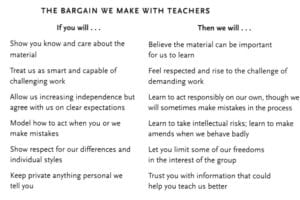“Effective educators at all grade levels possess something more significant than content knowledge: a deep understanding of their students “(Brown)
“Teaching middle school is not a job for those whose primary aspiration as an educator is the transmission of content.” (Brown)
I Continue reading teaching middle school students may not be that terrible
Monthly Archives: December 2016
BFF Teachers
“To a certain extent you have to have a personality that students respond to. But that doesn’t mean you have to be our best friend because that will cause our education to suffer. I hate to admit it, but respect and authority are part of the job. Kids expect adults to give us directions and boundaries, but it’s a balance”. -Vance (Cushman, 2003).
This quote stood out to me because of the word balance. I have felt like I have yet to strike the balance between respected and liked. I feel that though I have developed a good rapport with my students this semester, I wonder if they respect me because they see me as a teacher. I know that my students seem to like me, but I wonder if is the novelty of my status as a student teacher. I have been given a lot of criticism about my personality not being assertive enough to handle high school. I have been told that I’m “too nice” or “too patient” and “let students walk over me”. I however, feel that I have made a lot of progress and ultimately feel that I was able to successfully create a respectful classroom environment. The moment I stopped trying to get students to like me, I started being my authentic self. I tried to use humor and be honest when I made mistakes or didn’t know the answer. I think that respect is incredibly important. High schoolers are not children and as this article says, they shouldn’t be treated as such. Also teachers are not high schoolers and should not act like they are to get students to “like” them. Respect is the most important takeaway I gained from my student teaching experience. I feel that because I showed respect to my students, they in turn, showed respect to me. I feel that though I may not have been assertive enough in my classroom discipline, I successfully created a safe environment where my students enjoyed learning and where I enjoyed teaching. I hope if I continue to teach high school, I can continue to develop a balance between assertiveness, authenticity and respect.
Last call
“Don’t denigrate us, especially in public. One teacher would say out loud, ‘You’re getting a D,’ or other negative things in front of other students, disrespecting them.”
An excerpt from Cushman’s “Fires in the Bathroom” Continue reading Last call
The Teacher/Student Contract
This diagram, from Cushman (2003) seemed to me to be a very appropriate way to end the semester. As teachers, I do believe we are in a sort of agreement with our students.
Testing the Two-by-Ten Strategy
Martha Allen, an adjunct professor at Dominican University’s Teacher Credential Program in San Rafael, California, asked her students teachers to use the Two-by-Ten Strategy with their toughest student. The results? Almost everyone reported a marked improvement in the behavior and attitude of their one-targeted students, and often of the whole class. Many teachers using the Two-by-Ten Strategy for the first time have had a similar corroborating experience: Their worst student became an ally in the class when they forged a strong personal connection with that student. This can be counterintuitive. But the students who seemingly deserve the most punitive consequences we can muster are actually the ones who most need a positive personal connection with their teacher. When they act out they are letting s know they are seeking a positive connection with an adult authority figure and that they need that connection first, before they can focus on learning content (Smith & Lambert 19). Continue reading Testing the Two-by-Ten Strategy
